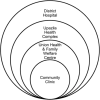Applying the Three Delays Model to understand emergency care seeking and delivery in rural Bangladesh: a qualitative study
- PMID: 33361169
- PMCID: PMC7759951
- DOI: 10.1136/bmjopen-2020-042690
Applying the Three Delays Model to understand emergency care seeking and delivery in rural Bangladesh: a qualitative study
Abstract
Objectives: The Three Delays Model has been commonly used to understand and prevent maternal mortality but has not been systematically applied to emergency medical conditions more generally. The objective of this study was to identify delays in emergency medical care seeking and delivery in rural Bangladesh and factors contributing to these delays by using the Three Delays Model as a framework.
Design: A qualitative approach was used. Data were collected through focus group discussions and in-depth interviews using semistructured guides. Two analysts jointly developed a codebook iteratively and conducted a thematic analysis to triangulate results.
Setting: Six unions in Raiganj subdistrict of Bangladesh.
Participants: Eight focus group discussions with community members (n=59) and eight in-depth interviews with healthcare providers.
Results: Delays in the decision to seek care and timely receipt of care on reaching a health facility were most prominent. The main factors influencing care-seeking decisions included ability to recognise symptoms and decision-making power. Staff and resource shortages and lack of training contributed to delays in receiving care. Delay in reaching care was not perceived as a salient barrier. Both community members and healthcare providers expressed interest in receiving training to improve management of emergency conditions.
Conclusions: The Three Delays Model is a practical framework that can be useful for understanding barriers to emergency care and developing more tailored interventions. In rural Bangladesh, training community members and healthcare providers to recognise symptoms and manage acute conditions can reduce delays in care seeking and receiving adequate care at health facilities.
Keywords: accident & emergency medicine; public health; qualitative research.
© Author(s) (or their employer(s)) 2020. Re-use permitted under CC BY-NC. No commercial re-use. See rights and permissions. Published by BMJ.
Conflict of interest statement
Competing interests: None declared.
Figures
References
-
- Institute for Health Metrics and Evaluation (IHME) Bangladesh profile. Seattle, WA: IHME, University of Washington, 2018. http://www.healthdata.org/bangladesh
-
- Global status report on road safety 2018. Geneva: World Health Organization; 2018. Licence: CC BYNC- SA 3.0 IGO. Available: https://www.who.int/violence_injury_prevention/road_safety_status/2018/en/
Publication types
MeSH terms
LinkOut - more resources
Full Text Sources
Medical


